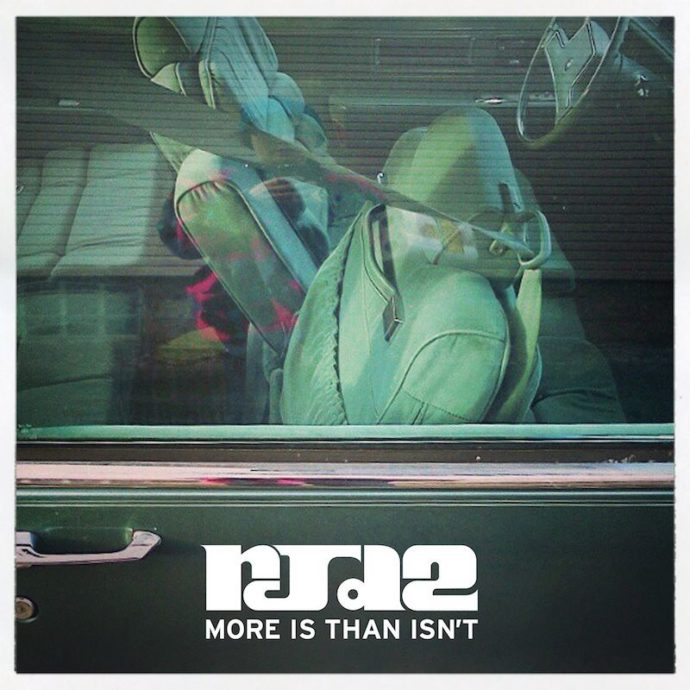By Eric Blendermann
If RJD2 were a chef instead of a prolific and eclectic hip-hop DJ, musician, and producer, he’d kill it on Chopped. For those not familiar with that cooking-competition TV show, the basic premise is: give a chef a basket of four or five seemingly random and incongruous ingredients, then tell him or her to figure out how to put them together and make something delicious. Some chefs can pull it off, some can’t, and the fun of watching comes in the moments when you say, “Holy crap, I can’t believe she put those things together, and damn if it didn’t turn out great!”
For more than a decade, since his breakout debut Dead Ringer (2002), RJD2 has applied much the same MO to his music making, and the results have been often beguiling, sometimes bewildering, and always interesting. His latest release, More Is Than Isn’t (out now on his own label, RJ’s Electrical Connections, continues his wide-ranging voyage through hip-hop and beyond, mixing beats, live instruments, all kinds of electronics, and sometimes vocals into his unique musical stew.
A perfect example of RJD2’s five-things-in-a-basket, so-wild-it-just-might-work approach is the album’s first single, “Her Majesty’s Socialist Request,” a brawl of cascading handclaps over roaring bass licks, overlaid with instrumental verses: first snake-charmer flutes, then turntable chirps, then blues piano licks, followed by meandering violins… what?!? It’s a completely crazy energy on the first listen, but after a few more spins it starts sounding more like mad genius.
Two other tracks in a similar crazy vein are “Behold, Numbers!” and “Descended from Myth,” each of which starts with a leftfield concept and builds it into an unforgettable groove. “Behold, Numbers!” sets a pattern of backwards-recorded percussion sounds underneath layers of off-kilter, stuttering string progressions, to create a dark, dramatic house track that will really get stuck in your head. And “Descended from Myth” takes a seemingly familiar marching-band chant on a voyage to the frontiers of electronics, with musical reference points shifting and returning.
Meanwhile, “A Lot of Night Ahead of You” and “Winter Isn’t Coming” feel like audio entries in a dream journal, musical ideas that sprang unbidden out of RJD2’s subconscious. “A Lot of Night” stacks arpeggios and echo effects over menacing trip-hop beats, with glimpses of a melody that’s quickly swallowed up again, while “Winter” is full of feverish energy and foreboding, almost beyond human tolerance. Not happy dream soundtracks, but compelling ones.
At the same time, when he has a mind to, RJD2 can craft a perfectly nice pop song, like “Temperamental,” featuring vocals by Phonte Coleman (formerly of Little Brother, now half of The Foreign Exchange); it’s a moody, midtempo soul cut that sounds like it could’ve been released in any of the past four decades. Likewise, “Dirty Hands” flutters in toward the end of the proceedings, setting lyrics about the complexities of adulthood, and maybe parenthood, over pretty strings and bells – it wouldn’t sound out of place on an album by Jason Mraz or even George Harrison. And even “Love and Go,” with beautiful vocals by Icebird collaborator Aaron Livingston gliding around an blippy underwater beat, could find an audience with more open-minded neo-soul fans.
More Is Than Isn’t seems to cover the whole range of RJD2’s musical imagination, from the around-the-way to the truly out-there. With several instrumental “suites” interspersed among the more finished tracks, the album feels like a sketchbook, with a different style on each page, but a unifying artistic intent throughout. Even the less successful tracks, like the hip-hop stream of consciousness “Bathwater” or the lascivious crooner “See You Leave,” are still ably attempted and consistent with RJD2’s history in hip-hop and soul.
Seems like RJD2 can do pretty much anything he wants, and he does do that – he’s fearless, he’ll try anything, and most of the time he makes it work. Thanks to his success in film TV work (his “A Beautiful Mine” instrumental is the theme to Mad Men), he’s got the freedom to explore any idea, any combination of musical ingredients that catches his imagination. Some of the tracks on More Is Than Isn’t may be an acquired taste, but give them a chance – after a few listens, they can stick with you.
Rating: 7.3/10

